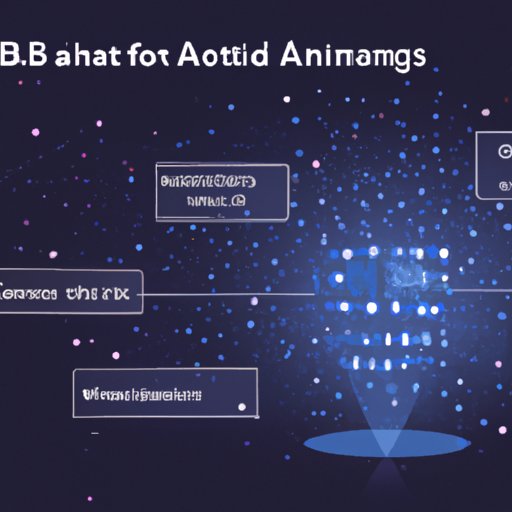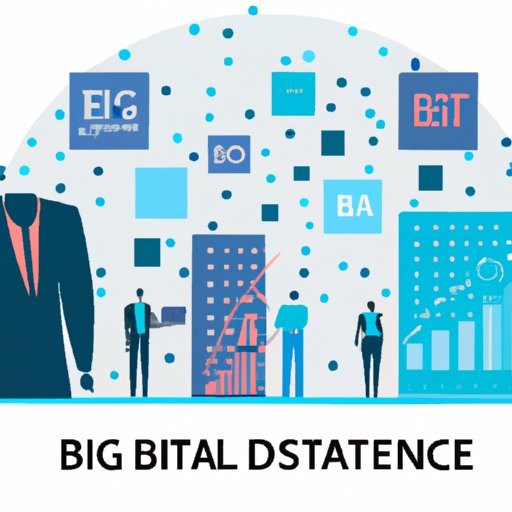Introduction
Big data and artificial intelligence (AI) are two of the most important topics in the tech world today. But what is the relationship between these two concepts? How does big data play a role in the development of AI applications? This article will explore the role of big data in artificial intelligence and examine the benefits of leveraging this data for AI applications.
Exploring the Role of Big Data in Artificial Intelligence
Big data is defined as large datasets that are too complex for traditional data processing tools. It can include structured, semi-structured, and unstructured data from multiple sources. Artificial intelligence, on the other hand, is the ability of machines to learn, think, and act like humans. These two concepts may seem unrelated, but they are actually closely intertwined. In order for AI algorithms to be effective, they need access to large amounts of data. Without it, AI applications would not be able to function properly.

How Big Data Powers the AI Revolution
Big data plays an essential role in the development of AI applications. According to a report published by McKinsey Global Institute, “Data is the fuel that powers AI”. The report states that “data availability is a key factor in the successful deployment of AI solutions, and those with access to more data have a competitive advantage”. This means that companies who have access to large datasets will be better positioned to leverage AI technology and gain a competitive edge over their rivals.
Unpacking the Intersection of Big Data and AI
At its core, AI is about recognizing patterns and making predictions based on those patterns. To do this, AI algorithms need access to large datasets so they can identify patterns and relationships within the data. By leveraging big data, AI algorithms can be trained to recognize patterns and make more accurate predictions than ever before. With access to more data, AI systems can become smarter and more efficient.

Benefits of Big Data for AI Applications
Using big data for AI applications has several advantages. Here are some of the ways that big data can benefit AI applications:
Improving Accuracy and Efficiency
One of the main benefits of using big data for AI applications is improved accuracy and efficiency. By leveraging large datasets, AI algorithms can be trained to recognize patterns and make more accurate predictions. This can lead to improved accuracy and efficiency, which can result in cost savings and improved customer satisfaction.
Enhancing Performance
Big data can also improve the performance of AI applications. By giving AI algorithms access to more data, they can become smarter and more capable of making better decisions. This can result in improved performance and increased productivity.
Reducing Development Time
Using big data for AI applications can also reduce development time. By leveraging large datasets, AI algorithms can be trained faster and more efficiently. This can help speed up the development process and get products to market faster.
Harnessing Big Data to Enhance AI Performance
In order to maximize the potential of AI applications, companies must find ways to effectively leverage big data. There are several ways that companies can do this, including:
Leveraging Data to Train AI Algorithms
One of the most effective ways to use big data for AI applications is to train AI algorithms. By giving AI algorithms access to large datasets, they can be trained to recognize patterns and make better predictions. This can help improve the accuracy and efficiency of AI applications.
Utilizing Big Data to Improve Model Performance
Big data can also be used to improve the performance of AI models. By giving AI algorithms access to more data, they can become smarter and more capable of making better decisions. This can result in improved model performance and increased productivity.

A Deeper Look at the Impact of Big Data on AI Development
The impact of big data on AI development goes beyond just training AI algorithms and improving model performance. Here are some of the other ways that big data can affect AI development:
Identifying Patterns and Relationships
Big data can help AI algorithms identify patterns and relationships within data sets. By leveraging large datasets, AI algorithms can be trained to recognize patterns and make more accurate predictions. This can lead to improved accuracy and efficiency.
Increasing Accessibility to Big Data
The availability of big data is one of the most important factors in the successful deployment of AI solutions. Companies must have access to large datasets in order to train AI algorithms and improve model performance. Fortunately, there are many tools and platforms available today that make it easier than ever to access and analyze big data.
Overcoming Challenges with Big Data
Despite the advantages of using big data for AI applications, there are still some challenges that must be overcome. For example, collecting, cleaning, and organizing large datasets can be a time-consuming and expensive process. Additionally, AI algorithms must be trained on large datasets in order to be effective, and this can take a long time. However, with the right tools and strategies, these challenges can be overcome.
Conclusion
Big data plays an essential role in the development of AI applications. By leveraging large datasets, AI algorithms can be trained to recognize patterns and make more accurate predictions. This can lead to improved accuracy and efficiency, enhanced performance, and reduced development time. Additionally, big data can help AI algorithms identify patterns and relationships within data sets, and increase accessibility to big data. Despite the challenges, companies can overcome these obstacles and reap the rewards of using big data for AI applications.
(Note: Is this article not meeting your expectations? Do you have knowledge or insights to share? Unlock new opportunities and expand your reach by joining our authors team. Click Registration to join us and share your expertise with our readers.)
